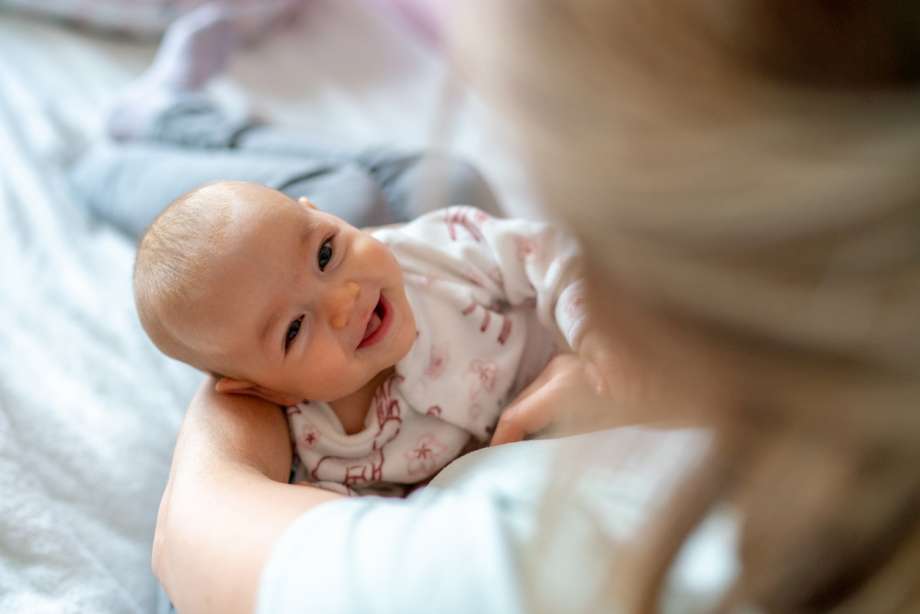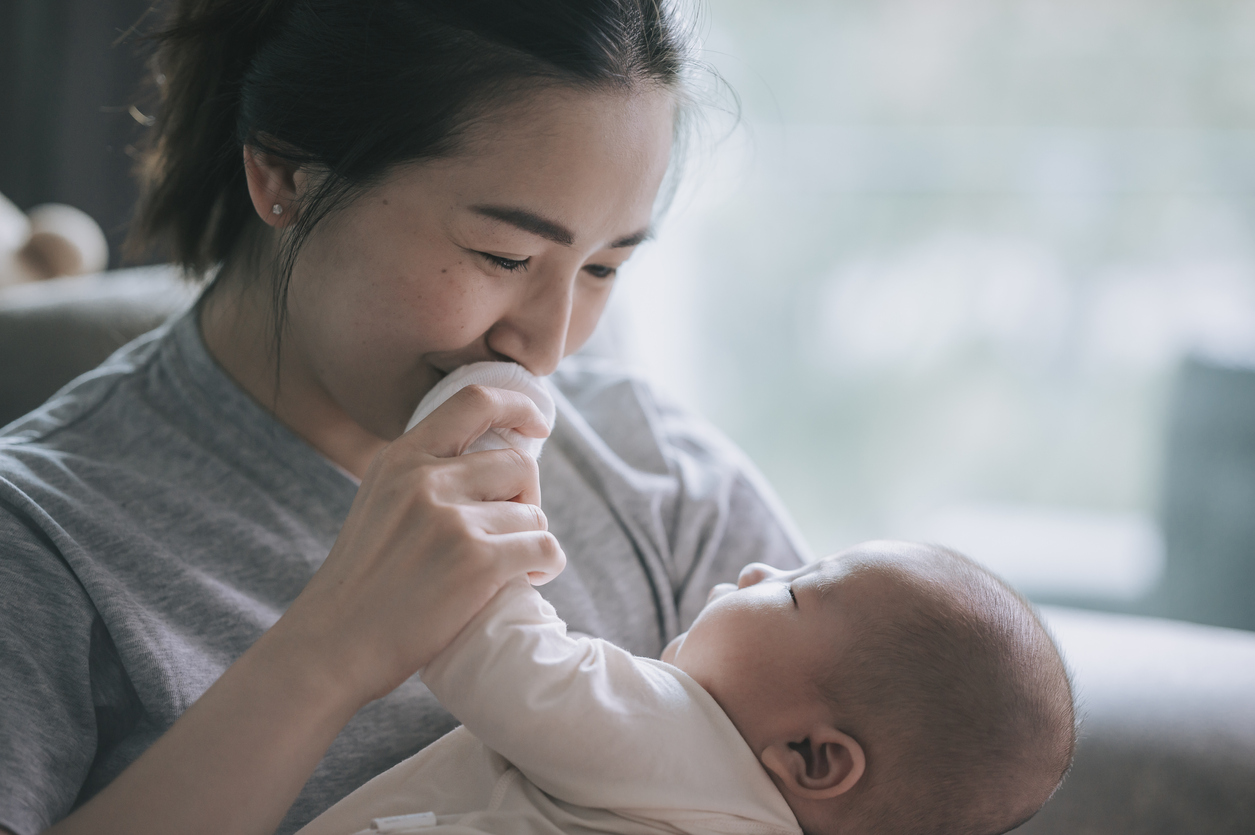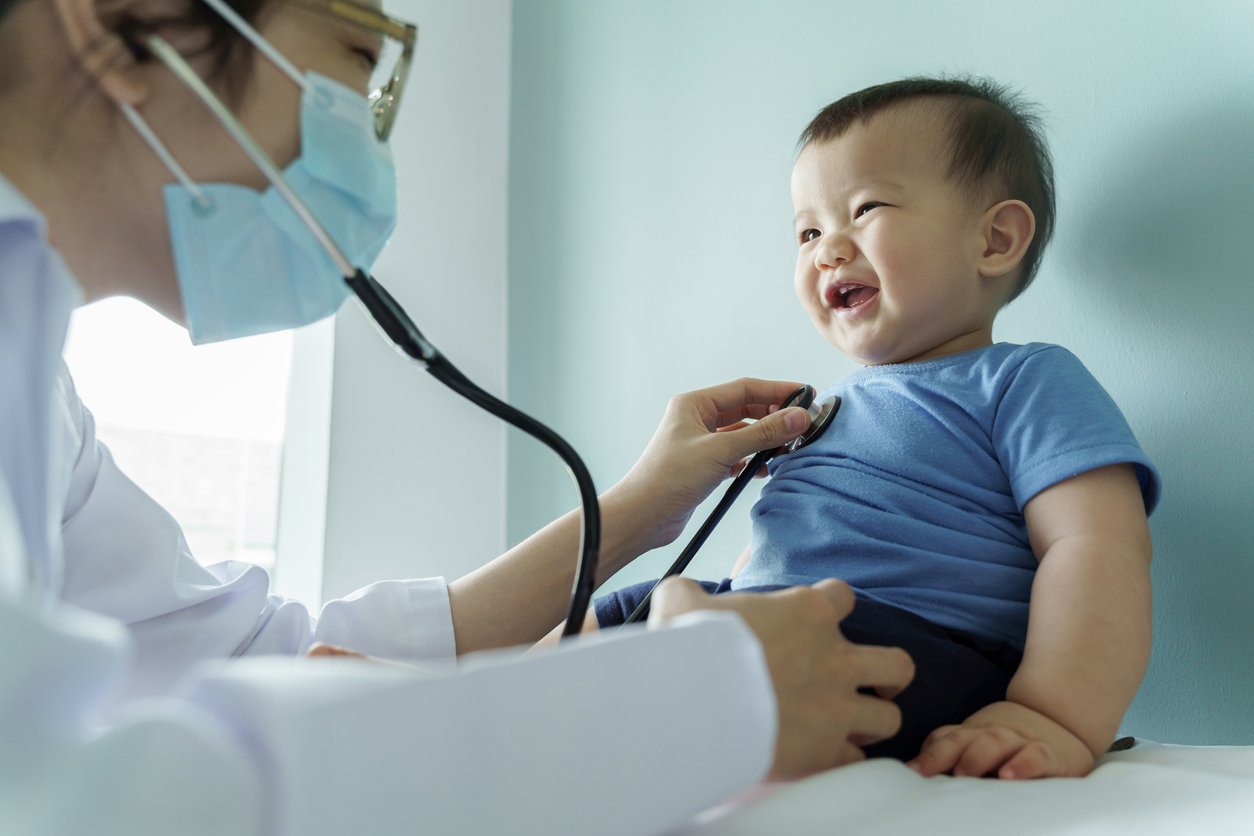A Guide to Hiccups in Newborns

Newborn hiccups are pretty common. But what causes them and how can you stop them?
What Exactly is a Hiccup?
You’ve probably experienced a bout of hiccups. Sometimes it’s after a few drinks, a large meal, hearing some exciting news, or even sharing a laugh with friends. Then after a few minutes of those annoying sounds, they go away on their own. So what is going on?
The diaphragm is a major respiratory muscle that separates the abdomen from the chest. The diaphragm contracts and pulls air into the lungs when you breathe in. When you breathe out, the diaphragm relaxes and forces air out of the lungs. The diaphragm is continually contracting and relaxing in a rhythm.
Hiccups occur when the diaphragm involuntarily contracts and is followed by the immediate closing of the vocal cords which creates the “hic” noise. It’s impossible to control when we get hiccups because they are a reflexive action similar to coughing or sneezing.
Causes of Hiccups in Newborns
A baby starts hiccuping when it’s in the womb. When the baby hiccups, the mother may feel a flutter or a short burst of movement.
You may have noticed that your newborn produces hiccups much more often than you or other adults.
There are many different causes of hiccups in newborns, including:
- If there is an excess of air in the baby’s stomach
- If the baby swallows down the ‘wrong way’. Babies who are still learning to feed may have trouble swallowing correctly, which can cause their diaphragm or esophagus to become irritated.
- If the baby eats too much or too quickly it can cause gas to build up in the stomach, which can push up against the diaphragm and lead to hiccups.
However, experts still aren’t completely sure why we get hiccups. They’re somewhat of a mystery.
Tips to Help a Newborn with Hiccups

Newborn hiccups are generally harmless. Typically, they last about 5 to 10 minutes before they go away on their own. However, if your baby seems bothered by them, there are ways to stop hiccups from occurring.
How to Prevent Newborn Hiccups
It may be difficult to completely prevent your newborn baby from getting hiccups; however, there are several methods you can try. These tips can also help ease tummy troubles and can offer benefits to your baby’s digestion.
- Record your baby’s feeding routine and when hiccups occur: Keep track of your baby’s feeding scheduling including when, where, position, frequency and amounts so you can adjust certain factors that may be causing their hiccups.
- Feed your baby when they are calm: Try not to wait until they are crying and overly hungry before you start feeding. This will prevent your baby from taking large gulps and feeding too fast.
- Sit your baby up after meals: Keep your baby upright for at least 20 minutes to help them digest and prevent the full stomach from rubbing against the diaphragm.
- Avoid large movements after feeding: After your baby is finished feeding, limit big movements such as bouncing, swinging, or lifting to minimize hiccups from being triggered.
- Feed your baby less but more frequently: Overfeeding can lead to hiccups so try giving your baby a little less during their feedings. If bottle feeding, take a look at the nipple and ensure it has a slow flow.
- Try different bottles and nipples: Certain bottles may trap more air than others. Try other brands, designs, and nipple types to see if it is causing the issue.
How to Get Rid of Baby Hiccups
There are a few ways to help get rid of hiccups when they occur.
- Burp your baby: If your baby is hiccuping while they feed or breastfeed, take a break and burp them. Regularly burping your baby can eliminate the excess gas trapped in their stomach which can help stop their hiccups. Be sure to burp your baby after feeding even if they don’t have hiccups. This can prevent spit-up.
- Rub their back: When your baby has hiccups, gently rub their back in a circular movement. When you carefully rub a baby’s back in this way, it helps to comfort them by removing excess air.
- Offer a pacifier: Pacifiers can help soothe an upset baby. When your baby uses a pacifier, the sucking motion can help relax the diaphragm and reduce the muscle’s involuntary contractions.
Some parents may swear by certain home remedies; however, it’s important to remember that although these may be effective for adults and children, they can be harmful to newborns.
Gripe water is an herb-infused water that some parents use to treat colic and other ailments. However, the World Health Organization states the following:
“Anything (including gripe water) other than breast milk administered to a baby during the first six months may increase the risk of introducing bacteria, causing allergies and irritating the baby’s intestines.”
When to See a Pediatrician

Hiccups are common in newborns and having bouts of them does not harm them. Babies that are less than a year old will hiccup frequently. Generally, they will run their course after 5 to 10 minutes.
However, if your baby is unable to sleep due to hiccups, continues to have bouts of hiccups after 12 months of age, or their hiccups last longer than 2 hours, it is best to consult with your pediatrician or your baby’s healthcare provider. Your baby may have digestive issues or other underlying medical conditions.
For instance, if your baby has hiccups with a lot of spit-up, vomiting and they are very fussy or irritable, they may have gastroesophageal reflux (GERD). This is also called acid reflux and occurs when stomach acid travels up into the esophagus and sometimes to the nose and mouth.
Other symptoms of GERD include coughing, crying excessively, arching the back after or during feeding, and lots of spitting up.
Your doctor will evaluate your baby’s feeding patterns and assess their growth and development to determine whether they have GERD.
Remember, hiccups are normal and generally nothing to be concerned or worried about.
Call 911 and seek medication attention right away if:
- The hiccups are causing your baby to have trouble breathing or feeding
- Your baby’s lips are slightly blue which could mean they have low oxygen levels

